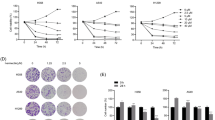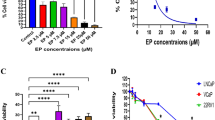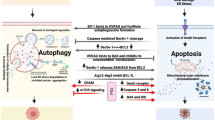Abstract
Background
5-fluorouracil-(5-FU)-based adjuvant chemotherapy is widely used for the treatment of colorectal cancer. However, 5-FU resistance in the course of treatment has become more common. Therefore, new therapeutic strategies and/or new adjuvant drugs still need to be explored.
Methods
Two colon-cancer-derived cell lines, colon26 and HT29, were used to investigate the effect of 5-FU, 3-methyladenine (3-MA, an autophagy inhibitor), or their combination on apoptotic cell death and autophagy. MTT assay, Hochest plus propidium iodide (PI) staining, and DNA fragmentation assay were used to observe apoptosis. Meanwhile, monodansylcadaverine (MDC) was used to detect autophagy. Finally, immunoblotting assay was used to explore the molecular change that occurred.
Results
We observed the apoptosis induced by 5-FU in colon cancer cells. Meanwhile, autophagy was also stimulated. The combination treatment of 3-MA and 5-FU significantly increased the apoptotic cell death. By isolating the subcellular fractions of mitochondria and cytosol, we observed that the release of cytochrome c was increased in combination-treated cells. Cytochrome c resulted in the activation of caspase-3, thus activating PARP. Moreover, the anti-apoptotic protein, Bcl-xL, was significantly downregulated by 3-MA.
Conclusions
Our results suggest that 5-FU-induced apoptosis in colon cancer cells can be enhanced by the inhibitor of autophagy, 3-MA. Autophagy might play a role as a self-defense mechanism in 5-FU-treated colon cancer cells, and its inhibition could be a promising strategy for the adjuvant chemotherapy of colon cancer.








Similar content being viewed by others
References
Xu R, Zhou B, Fung PCW, Li X. Recent advances in the treatment of colon cancer. Histol Histopathol. 2006;21:867–72.
Chau I, Cunningham D. Adjuvant therapy in colon cancer: current status and future directions. Cancer Treat Rev. 2002;28:223–36.
Chau I, Cunningham D. Adjuvant therapy in colon cancer-what, when and how? Ann Oncol. 2006;17:1347–59.
Huerta S, Goulet EJ, Livingston EH. Colon cancer and apoptosis. Am J Surg. 2006;191:517–26.
Nordman IC, Iyer S, Joshua AM, Clarke SJ. Advance in the adjuvant treatment of colorectal cancer. ANZ J Surg. 2006;76:373–80.
Wils J, O’Dwyer P, Labianca R. Adjuvant treatment of colorectal cancer at the turn of the century: European and US perspectives. Ann Oncol. 2001;12:13–22.
Giacchetti BS, Perpoint B, Zidani R, et al. Phase III multicenter randomized trial of oxaliplatin added to chronomodulated fluorouracil–leucovorin as first-line treatment of metastatic colorectal cancer. J Clin Oncol. 2000;18:136–47.
Douillard JY, Cunningham D, Roth AD, et al. Irinotecan combined with fluorouracil compared with fluorouracil alone as first-line treatment for metastatic colorectal cancer: a multicentre randomised trial. Lancet. 2000;355:1041–7.
Longley DB, Harkin DP, Johnston PG. 5-Fluorouracil: mechanisms of action and clinical strategies. Nat Rev Cancer. 2003;3:330–8.
Grem JL. 5-fluorouracil: forty-plus and still ticking. A review of its preclinical and clinical development. Invest New Drugs. 2000;18:299–313.
Lowe SW, Lin AW. Apoptosis in cancer. Carcinogenesis. 2000;21:485–95.
Petiot A, Ogier-Denis E, Blommaart EFC, Meijer AJ, Codogno P. Distinct classes of phosphatidylinositol 3′ kinases are involved in signaling pathways that control macroautophagy in HT–29 cells. J Biol Chem. 2000;275:992–8.
Yan CH, Liang ZQ, Gu ZL, Yang YP, Reid P, Qin ZH. Contributions of autophagic and apoptotic mechanisms to CrTX induced death of K562 cells. Toxicon. 2006;47:521–30.
Cui Q, Tashiro S, Onodera S, Ikejima T. Augmentation of oridonin-induced apoptosis observed with reduced autophagy. J Pharmacol Sci. 2006;101:230–9.
Klionsky DJ, Emr SD. Autophagy as a regulated pathway of cellular degradation. Science. 2000;290:1717–21.
Meijer AJ, Codogno P. Regulation and role of autophagy in mammalian cells. Int J Biochem Cell B. 2004;36:2445–62.
Ng G, Huang JX. The significance of autophagy in cancer. Mol Carcinogen. 2005;43:183–7.
Ogier-Denis E, Codogno P. Autophagy: a barrier or an adaptive response to cancer. BBA-Rev Cancer. 2003;1603:113–28.
Kondo Y, Kanzawa T, Sawaya R, Kondo S. The role of autophagy in cancer development and response to therapy. Nat Rev Cancer. 2005;5:726–34.
Hoorens A, Casteele MV, Klöppel G, Pipeleers D. Glucose promotes survival of rat pancreatic cells by activating synthesis of proteins which suppress a constitutive apoptotic program. J Clin Invest. 1996;98:1568–74.
Munafó DB, Colombo MI. A novel assay to study autophagy: regulation of autophagosome vacuole size by amino acid deprivation. J Cell Sci. 2001;114:3619–29.
Abedin MJ, Wang D, McDonnell MA, Lehmann U, Kelekar A. Autophagy delays apoptotic cell death in breast cancer cells following DNA damage. Cell Death Differ. 2006;22: 1–11.
Biederbick A, Kern HF, Elsasser HP. Monodansylcadaverine (MDC) is a specific in vivo marker for autophagic vacuoles. Eur J Cell Biol. 1995;66:3–14.
Shimizu S, Kanaseki T, Mizushima N, Mizuta T, Arakawa-Kobayashi S, Thompson CB, et al. Role of Bcl–2 family proteins in a non-apoptotic programmed cell death dependent on autophagy genes. Nat Cell Biol. 2004;6:1221–8.
Herman-Antosiewicz A, Johnson DE, Singh SV. Sulforaphane causes autophagy to inhibit release of cytochrome c and apoptosis in human prostate cancer cells. Cancer Res. 2006;66:5828–35.
Klionsky DJ, Levine B. Development by self-digestion: molecular mechanisms and biological functions of autophagy. Dev Cell. 2004;6:463–77.
Liang XH, Jackson S, Seaman M, Brown K, Kempkes B, Hibshoosh H, et al. Induction of autophagy and inhibition of tumorigenesis by beclin 1. Nature. 1999;402:672–6.
Qu XP, Yu J, Bhagat G, et al. Promotion of tumorigenesis by heterozygous disruption of the beclin 1 autophagy gene. J Clin Invest. 2003;112:1809–20.
Ding WX, Ni HM, Gao WT, et al. Differential effects of endoplasmic reticulum stress-induced autophagy on cell survival. J Biol Chem. 2007;282:4702–10.
Bauvy C, Gane P, Arico S, Codogon P, Ogier-Denis E. Autophagy delays Sulindac Sulfide-induced apoptosis in the human intestinal colon cancer cell line HT-29. Exp Cell Res. 2001;268:139–49.
Kanzawa T, Germano IM, Komata T, Kondo Y, Kondo S. Role of autophagy in temozolomide-induced cytotoxicity for malignant glioma cells. Cell Death Differ. 2004;11:448–57.
Paglin S, Hollister T, Delohery T, et al. A novel response of cancer cells to radiation involves autophagy and formation of acidic vesicles. Cancer Res. 2001;61:439–44.
Kanzawa T, Kondo Y, Ito H, Kondo S, Germano I. Induction of autophagic cell death in malignant glioma cells by arsenic trioxide. Cancer Res. 2003;63:2103–8.
Gozuacik D, Kimchi A. Autophagy and cell death. Curr Top Dev Biol. 2007;78:217–45.
Bursch W, Ellinger A, Kienzl H, et al. Active cell death induced by the anti-estrogens tamoxifen and ICI164 384 in human mammary carcinoma cells (MCF–7) in culture: the role of autophagy. Carcinogenesis. 1996;17:1595–607.
Cao C, Subhawong T, Albert JM, et al. Inhibition of mammalian target of rapamycin or apoptotic pathway induces autophagy and radiosensitizes PTEN null prostate cancer cells. Cancer Res. 2006;66:10040–7.
Iwamaru A, Kondo Y, Iwado E, et al. Silencing mammalian target of rapamycin signaling by small interfering RNA enhances rapamycin-induced autophagy in malignant glioma cells. Oncogene. 2007;26:1840–51.
Zhu HB, Guo W, Zhang LD, et al. Bcl-xL small interfering RNA suppresses the proliferation of 5-fluorouracil-resistant human colon cancer cells. Mol Cancer Ther. 2005;4:451–6.
Tsujimoto Y. Cell death regulation by the Bcl–2 protein family in the mitochondria. J Cell Physiol. 2003;195:158–67.
Pattingre S, Tassa A, Qu XP, et al. Bcl-2 antiapoptotic proteins inhibit beclin 1-dependent autophagy. Cell. 2005;122:927–39.
Acknowledgments
This work was supported by the 21st Century COE Program, Japan and the Japan Society for the Promotion of Science (JSPS) for A. Faried.
Author information
Authors and Affiliations
Corresponding author
Rights and permissions
About this article
Cite this article
Li, J., Hou, N., Faried, A. et al. Inhibition of Autophagy by 3-MA Enhances the Effect of 5-FU-Induced Apoptosis in Colon Cancer Cells. Ann Surg Oncol 16, 761–771 (2009). https://doi.org/10.1245/s10434-008-0260-0
Received:
Revised:
Accepted:
Published:
Issue Date:
DOI: https://doi.org/10.1245/s10434-008-0260-0




